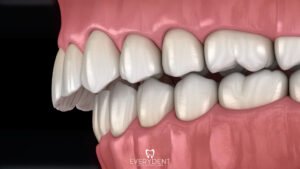What is Teeth Clenching (Bruxism)?
Teeth clenching, also known as bruxism, is a condition in which a person clenches or grinds their teeth, often without realizing it. This condition, which mostly occurs during sleep, may also occur involuntarily during the day. Bruxism, a very common problem, is a serious disorder that can damage teeth, jaw joints and facial muscles in the long run, although it is underestimated by most people.
If left untreated, it can cause many problems that negatively affect a person’s quality of life, as well as physical discomfort such as erosion of tooth enamel, jaw pain and headaches. Therefore, recognizing the symptoms of bruxism early and applying appropriate treatment methods is very important to maintain a healthy mouth and jaw structure.
What are the symptoms of Bruxism?
Wear on Teeth: Constant pressure of teeth on each other as a result of bruxism can cause significant wear on tooth surfaces. These abrasions cause the natural surface texture of the teeth to flatten or the enamel to thin. Teeth may become shorter and their natural shape may be lost.
Pain in the Jaw: Since the jaw muscles are overworked due to teeth clenching, you may feel pain, stiffness or fatigue in your jaw, especially when you wake up in the morning. This pain may sometimes become more pronounced while eating or talking. This discomfort felt in the jaw joints negatively affects your daily life and can sometimes even cause neck and shoulder pain.
Headache: Excessive tension of the jaw muscles due to teeth grinding can cause headaches concentrated in the temple area of the head. These pains usually start as a slight feeling of pressure and may intensify over time. These headaches, especially felt as soon as you wake up in the morning, can affect you throughout the day.
Sensitivity in Teeth: Constant clenching and grinding of teeth causes tooth enamel to wear away and tooth surfaces to become more vulnerable. This condition manifests itself with increased sensitivity to hot, cold, sweet or acidic foods and drinks.

Cracked or Fractured Teeth: Bruxism can lead to microscopic cracks or serious fractures in the teeth due to the constant and excessive pressure applied to the teeth. This type of damage can be painful and may cause the teeth to need treatment methods such as fillings and crowns.
Jaw Noises: Bruxism can affect the normal functioning of the jaw joints. Clicking or crackling sounds when the jaw is moved may be a sign of joint malalignment or deterioration in the joint structure.
Sleep Problems: Since bruxism usually occurs during sleep, the sound of teeth grinding is often not noticed by the person. However, your spouse or family members may notice this sound during sleep. Additionally, bruxism can negatively affect the quality of sleep, causing you to wake up tired in the morning.
Causes of Teeth Grinding
The biggest reasons for teeth grinding are; Stress and anxiety, sleep disorders, malocclusion, genetic factors, medication side effects and lifestyle habits are the main factors that can cause bruxism. While intense stress and anxiety brought about by daily life may cause individuals to clench their teeth without realizing it, sleep disorders such as sleep apnea may trigger involuntary work of the jaw muscles. If the teeth do not fit together properly, it can cause unnatural pressure on the jaw joints, increasing the tendency to clench.
Additionally, genetic predisposition may increase the risk of this condition in people with a family history of bruxism. Medications that act on the nervous system, such as some antidepressants and sleep regulators, may also trigger bruxism as a side effect. In addition, habits such as excessive caffeine and alcohol consumption or smoking may contribute to the exacerbation of bruxism by both reducing sleep quality and negatively affecting the jaw muscles.

Problems That Bruxism May Cause
Untreated, this condition can have serious effects on both your teeth and your general health.
Tooth Loss: Excessive pressure can cause cracks, fractures, and tooth loss in later stages.
Jaw Joint Problems: Temporomandibular joint (TMJ) disorders can restrict jaw movements. This can affect situations such as eating and speaking and interfere with our daily lives.
Aesthetic Problems: Too much wear of the teeth negatively affects the aesthetics of the smile.
How to Prevent Teeth Grinding
Treatment of bruxism is generally based on the underlying causes and the needs of the individual. Night plates used to protect teeth prevent teeth from being damaged by friction, while stress management techniques such as yoga, meditation or therapy are of great benefit in cases where stress triggers bruxism. If there is a problem such as improper closure of the teeth, this can be corrected with orthodontic treatments recommended by the dentist.
Muscle relaxants can be used under the supervision of a doctor to help relax the jaw muscles, and behavioral therapies aimed at making people aware of the habit of clenching their teeth can be effective in changing this habit. In addition, botox applications to limit excessive work of the jaw muscles have become one of the frequently preferred methods in the treatment of bruxism in recent years.

Dental Plate Prices
Night aligners are custom-designed oral appliances to control teeth clenching (bruxism) and prevent tooth wear. These plates, made of hard acrylic or soft thermoplastic materials, relax the jaw muscles and prevent the teeth from rubbing against each other during sleep.
Prices; It may vary depending on the quality of the material used, the type of plate and the techniques applied during the treatment. Since it requires special production according to personal measurements, the cost of night aligners is determined depending on the treatment plan and needs. Night aligner offers an effective and long-term solution for a healthy oral structure and comfortable sleep.




